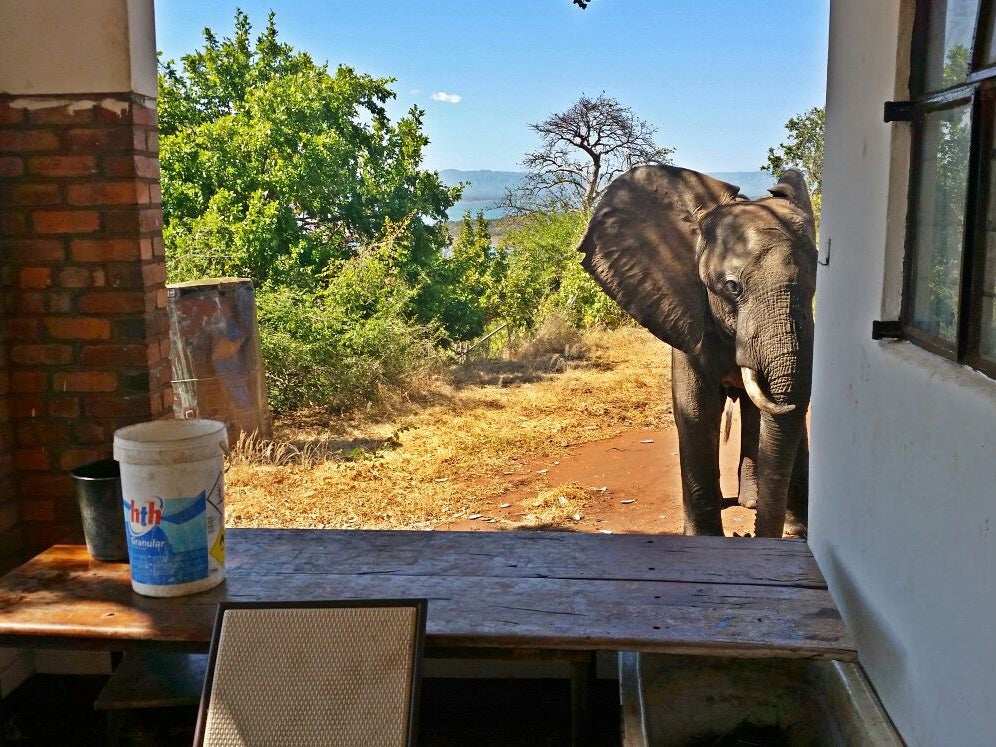Elephant shot by poachers saved after appearing to plead for help from humans
The animal was found dehydrated and limping outside the staff houses of a safari lodge

An injured bull elephant surprised guests and workers at a safari in Zimbabwe when he appeared to approach them for help, and then waited for five hours until a vet arrived.
The huge animal – which has since been named Ben – was dehydrated and limping badly, and photographs show him looking inside a building, possibly for assistance.
On closer inspection, workers from the Bumi Hills Foundation found the animal had two bullet holes through his left ear and a septic wound on his shoulder, believed to be the result of a failed poaching attempt.
The bullet holes in Ben’s ears were found to be old, but the wound in his shoulder was in need of urgent attention.
Unfortunately, the foundation’s conservation manager was away, so they arranged for a vet, Dr Richard Hoare, to fly from Harare to administer much-needed treatment to the animal.
The vet, along with the team at the foundation, tranquilized the animal and cleaned out the wound. They also added a VHF tracking device to the animal so they can follow its progress.
Nick Milne, Trust Manager of the foundation, said: "The nature and cause of the wound has left us all very puzzled. It is a large entry hole, approximately 4cm in diameter, perfectly round and smooth and extends approximately 10cm downwards into his shoulder joint and there are no other wounds visible on the animal at all.
"The wound itself was approximately a month old but again this is difficult to tell exactly. The nature of the wound suggests that if caused by a bullet it was fired from an elevated position down onto the animal, not a commonly used method of shooting an animal but with our rugged terrain quite possible.
"The fact that no other wounds were visible it is impossible for the bullet head to have exited the animal but nothing was picked up on the highly sensitive metal detector.
"We will arrange for a mobile x-ray unit to be brought in if he requires follow up treatment which will hopefully give us a better idea of what happened."

He said the team at the foundation are keeping a close eye on the elephant, believed to be in his thirties, and are monitoring his progress. The most recent sighting of Ben suggests his wound and mobility have improved slightly, although he is still in a lot of pain.
"What is positive is that he is still feeding and drinking well so all the signs suggest that despite having a long road to recovery ahead of him there is a good chance he will make it," said Mr Milne.
Poaching in the area is rife, and the Bumi Hills Foundation was founded in March and works with the Bumi Hills Anti Poaching Unit to combat the problem.
Mr Milne added: "The nature of the poaching has changed and now we are facing much more threatening and sophisticated armed ivory poaching gangs, very similar to and almost definitely linked to the organised gangs involved in rhino poaching in South Africa.
"From data collected in aerial surveys carried out over Zimbabwe in 2001 and again in 2013 there has been an estimated decrease in elephant numbers of 75% in the Sebungwe area."
The foundation has since launched the #helpben campaign to try and raise funds to cover the cost of the elephant’s on-going treatment.
Join our commenting forum
Join thought-provoking conversations, follow other Independent readers and see their replies
Comments
Bookmark popover
Removed from bookmarks